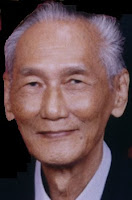Conversion Story of a Meat-Eater
I was a die-hard meat-eater, specifically a chicken-eater. Hence, it was beyond my wildest dreams that after more than 30 years of eating meat, I would become a Flexitarian.
I have known vegetarianism for a long time, from 3 main perspectives: environment, religion & health. But it never crossed my mind to become vegetarian because I just couldn't forgo my favourite deep-fried, curried, BBQ, Samsui and Gongbao chicken! Besides, I was happily healthy, spiritually religious and environmentally green - without being vegetarian; there was just no compelling reason for me to make the diet switch!
Then it happened suddenly: one fine day, I chanced upon a freely-distributed VCD entitled "Seeds for a Better World" from a vegetarian stall. After watching it, I immediately converted to vegetarianism! The key video clip in the VCD which changed my life can be downloaded here.
I was really appalled at how much animals suffer just because of our insatiable demand for meat! They are treated like factory products rather than living things! Although we do not torture them directly, we are indirectly supporting such barbarity by consuming huge amounts of meat; to meet demands with good profit margins, suppliers have to maximise production at minimum costs, which leads to hellish living conditions for the animals!
As I still need to take into consideration the needs of my family, I became a Flexitarian rather than a Vegan. In any case, I am glad that I am doing what I can to reduce the sufferings of innocent animals. What about you? If a 30-year meat-eater like me can do it, so can you! And vegetarian food is actually far healthier and tastier than you could imagine! Find out more here!
I have known vegetarianism for a long time, from 3 main perspectives: environment, religion & health. But it never crossed my mind to become vegetarian because I just couldn't forgo my favourite deep-fried, curried, BBQ, Samsui and Gongbao chicken! Besides, I was happily healthy, spiritually religious and environmentally green - without being vegetarian; there was just no compelling reason for me to make the diet switch!
Then it happened suddenly: one fine day, I chanced upon a freely-distributed VCD entitled "Seeds for a Better World" from a vegetarian stall. After watching it, I immediately converted to vegetarianism! The key video clip in the VCD which changed my life can be downloaded here.
I was really appalled at how much animals suffer just because of our insatiable demand for meat! They are treated like factory products rather than living things! Although we do not torture them directly, we are indirectly supporting such barbarity by consuming huge amounts of meat; to meet demands with good profit margins, suppliers have to maximise production at minimum costs, which leads to hellish living conditions for the animals!
As I still need to take into consideration the needs of my family, I became a Flexitarian rather than a Vegan. In any case, I am glad that I am doing what I can to reduce the sufferings of innocent animals. What about you? If a 30-year meat-eater like me can do it, so can you! And vegetarian food is actually far healthier and tastier than you could imagine! Find out more here!


Comments
Sorry to barge in on your blog, but I do a BlogPulse! search on "vegan" periodically for my website, ananimalfriendlylife.com, and came across your post.
Best,
Eric
Los Angeles, CA
For example, if one insists on eating only strict vegetarian food during family meals, causing inconvenience and frustration to the family, then not only will relationships be strained, the vegetarian cause would be adversely affected too.
I chose to be a flexitarian at this moment to spread the message of vegetarianism and compassion for animals while being sensitive and thoughtful of others.
Therefore, it is still possible to reduce the sufferings of animals by being flexitarian because it reduces the demand of meat while effectively witnessing to vegetarianism and its humane cause.
Would you like to help out with Vegetarian Society Singapore, a volunteer group? You can contact george@vegetarian-society.org :)
Rgds,
Andy
----------
james wilkins
Link Building